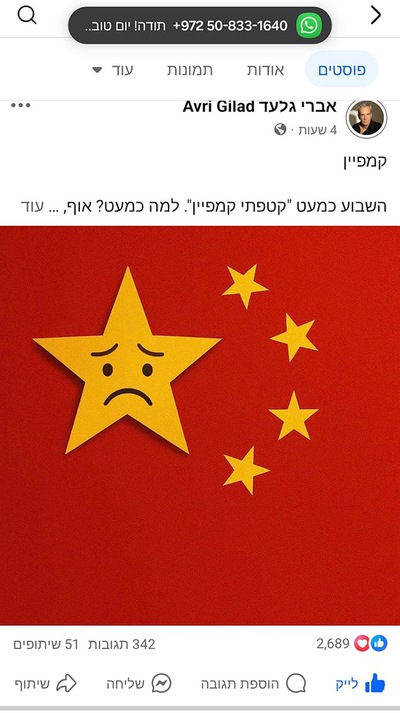(Minghui.org) Shishabat, an Israeli magazine, published an article by Avri Gilad on July 30, 2025, on his observations of the challenges Jewish people are facing today. In the article, Gilad mentioned that he refused an advertising offer to endorse a Chinese product because of the Chinese Communist Party’s (CCP) track record for persecuting Falun Gong practitioners, Uyghurs, Tibetans, and other minorities, and for its practice of harvesting organs from them without their consent.
Shishabat is the weekend magazine included in Israel Hayom (Israel Today) the most widely distributed newspaper in the nation. Gilad is a well-known broadcaster, having started his career as a host on the Israel Defense Forces Radio and then hosting several television shows. In 2009, he ranked among the top 10 highest-earning television personalities in Israel. He was also one of the first media figures in Israel to respond on television to the persecution of Falun Gong in China during the early years, when reports on the topic were rare.
In his article “Vote by trend on TikTok? The great danger of the new proposal in the Knesset,” Gilad dedicated a section to explaining why he declined the offer to endorse the advertisement—because he believed the advertisement would support the CCP.
After his article was published in Shishabat, Gilad published that particular section on his Facebook page and won thousands of “Likes” and hundreds of sympathetic responses to his courageous decision to stand up for the minorities being persecuted by the CCP, including Falun Gong practitioners.
 Gilad’s article on the Shishabat website
Gilad’s article on the Shishabat website
The following are excerpts of Gilad’s original article, reprinted below with permission from the author and Shishabat.
“This week I almost got an advertising endorsement. Why almost? Ugh, me and my principles. And so it was: I got a call from an advertising agency, and the guy on the other end told me they had chosen me to be the presenter of a new product in Israel.
“Getting an advertising endorsement is considered an achievement in my field, both financially and in terms of image. It means that my image, that separate entity from me that people associate with me, is credible enough to make people buy something. And that also means quite a bit of money.
“And while I’m rolling my eyes at future profits, I realize that the product I’m supposed to advertise is Chinese. And I remember that just a few days ago I gave a speech [on a television show] discouraging buying products from China.”
Gilad wrote that he had read an article by an Israeli commentator, who’d noted that China was one of the largest funders of propaganda defaming Jews and Israel on American college campuses, and that China was not doing this because China is anti-Semitic, but to stir up division and controversy within American society and to disrupt it from within.
“I have had an interest in the Chinese for many years: the ongoing persecution of Falun Gong practitioners, the harvesting of their organs for transplants, the persecution of other minorities such as the Uyghurs, the enslavement of the peace-loving Tibetan people—all of these create a constant tension in me between the desire to enjoy Chinese products and the unwillingness to support this murderous regime with my money.
“And now they’re offering me a chance to endorse an advertisement. So what do I do? Take the money and hold my nose—or stand by my principles and give up the money, a lot of money, which, if I don’t take, someone else gladly will?
“I tried to convince myself: Everyone buys from China, I buy from China, too, everything is from China, and it’s better that if someone benefits from them, it’s me. But I wasn’t convinced. Buying is one thing—cooperating is something else. I sent a message: ‘I can’t. My conscience won’t allow it. Hopefully, I’ll soon have it surgically removed—in China, of course—and replace it with a conscience from China, one that looks great, but regularly transmits all the data to the Communist Party headquarters.’”
Copyright © 1999-2025 Minghui.org. All rights reserved.










